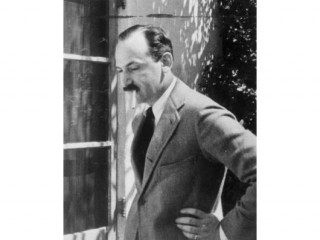
Nathanael West biography
Date of birth : 1903-10-17
Date of death : 1940-12-22
Birthplace : New York City, New York, U.S.
Nationality : American
Category : Famous Figures
Last modified : 2011-12-19
Credited as : novelist, Mythic theme, A Cool Million
The work of the American novelist Nathanael West (1903-1940) is strikingly original. It is characterized by its use of Mythic themes in contemporary settings, terrifying symbolism, profound pessimism, and grisly humor.
Nathanael West was born Nathan Weinstein in New York City of affluent Russian-Jewish immigrants. After graduating from Brown University in 1924 with a bachelor of philosophy degree, he held a number of nonwriting jobs. In 1927 he became manager of the Kenmore Hotel in New York City and in 1928 of the Sutton Hotel; he frequently gave rooms rent-free to indigent friends. West's acquaintance with poverty grew more directly personal in 1929, when his family suffered complete financial ruin.
The Dream Life of Balso Snell (1931), West's first novel, was written at college and is generally regarded as the weakest of his four novels. It is based on a Quest motif, but settles into a misanthropic, scatological attack on Christianity and Judaism.
West's next novel should have marked an upturn in his writing fortunes, but he was the victim of freakishly bad luck. His masterpiece, Miss Lonelyhearts (1933), was enthusiastically reviewed, but the publisher went bankrupt, the printer refused to deliver most of the edition, and the book sold fewer than 800 copies. (It has sold over 300, 000 copies since West's death.) A variation on the Scapegoat theme, Miss Lonelyhearts explores attitudes toward the problem of suffering. Its hero, who is never named but is identified by his role as a newspaper columnist, is an idealist; he refuses to accept the other newsmen's cynical view of his lonely hearts newspaper column as a joke. Moved by his correspondents' grotesque but genuine pleas for help, he becomes caught up in their lives and is ultimately killed by one of them. A contemporary projection of a Christ figure, the novel is a masterpiece of economy. Critic Stanley Edgar Hyman called it "one of the three finest American novels of our century."
Ironically, although Miss Lonelyhearts sold badly, it led West to a job in Hollywood as adviser on the film adaptation. The movie, an artistic disaster, reduced his morally centered theme to a simple murder melodrama. (A remake 25 years later was somewhat better.)
West's third novel, A Cool Million (1934), utilizing the myth of the Holy Fool, is a bitterly satiric treatment of American politics. Lemuel Pitkin, who is in the Candide—Horatio Alger mold, sets forth with naive good will, only to be consistently victimized, often violently.
West spent his last five years in Hollywood as a scenarist. His final novel, The Day of the Locust (1939), is based on the Mythic Dance of Death. A group of characters on the fringe of Hollywood are used as a quintessential symbol of American violence and emptiness. Especially jarring is its final scene, a grotesque, surrealistic treatment of a film premiere which deteriorates into mob frenzy. The book received favorable reviews but sold fewer than 1500 copies. (It, too, has sold over 300, 000 copies since West's death.) On Dec. 22, 1940, West and his wife, Eileen McKenney, were killed in an automobile accident near El Centro, Calif., just a few days before the opening of My Sister Eileen, the hit play immortalizing Mrs. West, written by her older sister, Ruth McKenney.
















